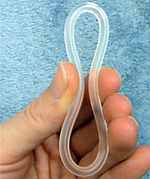Progesterone vaginal ring
| Progesterone vaginal ring | |
|---|---|

A similar birth control vaginal ring
|
|
| Background | |
| Type | Hormonal |
| First use | 1998 |
| Failure rates (first year) | |
| Perfect use | ? |
| Typical use | 1.5% |
| Usage | |
| Duration effect | 3 months |
| User reminders | ? |
| Advantages and disadvantages | |
| STI protection | no |
| Period advantages | periods may not occur while ring is inserted |
| Benefits | easy insertion and removal |
Progesterone vaginal ring, also known as progesterone-only vaginal ring, is a form of vaginal ring used for birth control when breastfeeding. Use can begin at four weeks and continue for at least up to a year following childbirth. Failure rates with usual use is about 1.5 per 100 women. It is used within the vagina with one ring lasting three months. The woman is able to place and remove the ring herself.
Side effects include vaginal discharge and pain with urination. It does not appear to be associated with serious side effects. With use menstrual periods often do not resume. It was specifically made for use with breastfeeding as it does not affect milk production. It works by gradually releasing the hormone progesterone.
Progesterone vaginal rings have been approved for medical use since 1998. It is on the World Health Organization's List of Essential Medicines, the most effective and safe medicines needed in a health system. As of 2014 they are available in a number of South and Central American countries. As of 2016 it is not available in the United States. It was developed by the Population Council and is sold under the brand name Progering.
...
Wikipedia
